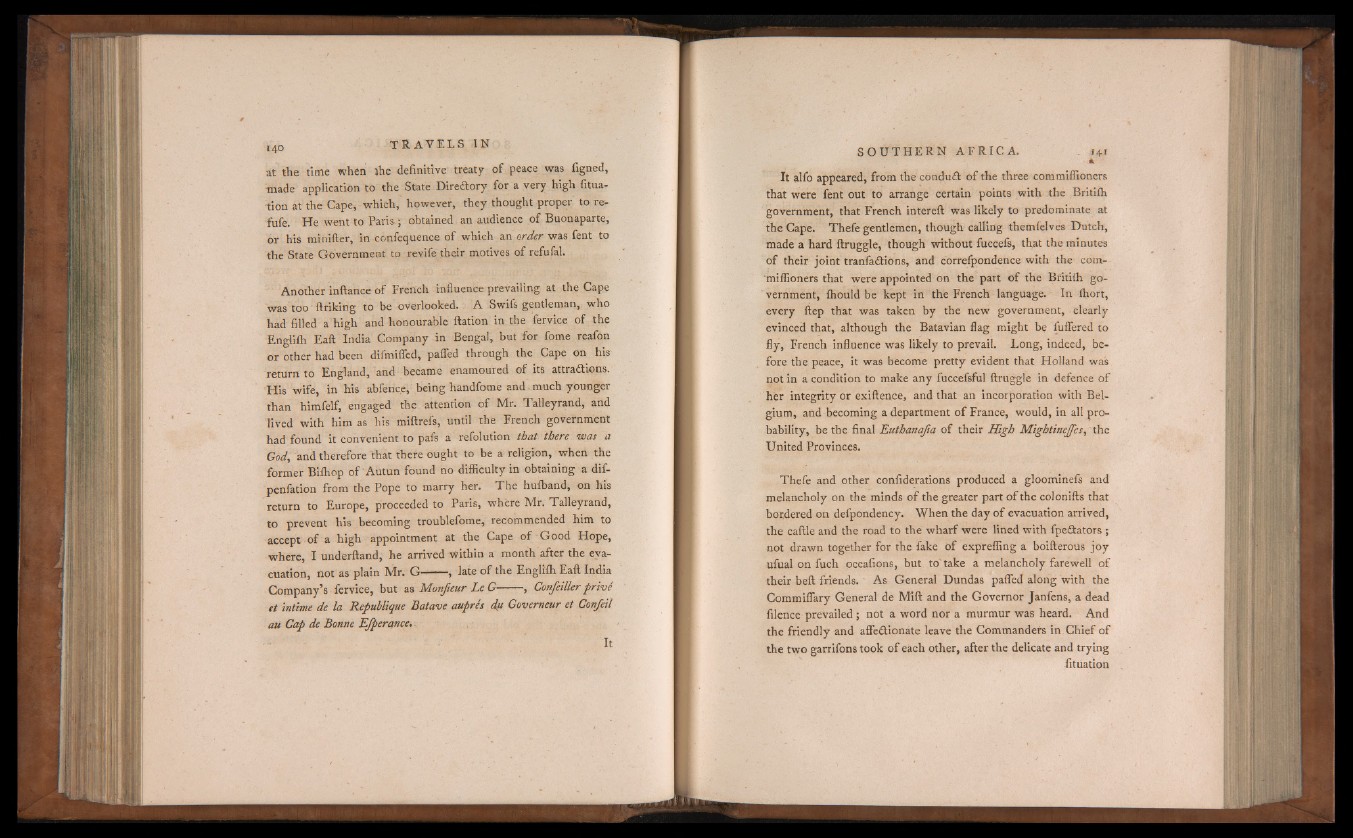
at the time when ihe definitive treaty of peace was figned,
made application to the State Directory for a very high fitua-
tion at the Cape» which, however, they thought proper to re-
fufe. He went to Paris-; obtained an audience of Buonaparte,
or his minifter, in confequence of which an order was fent to
the State Government to revife their motives of refufal.
Another inftance of French influence prevailing at the Cape
was too ftriking to be overlooked. A Swifs gentleman, who
had filled a high and honourable ftation in the fervice of the
Engliih Eaft India Company in Bengal, but for fome reafon
or other had been difmifled, paffed through the Cape on his
return to England, and became enamoured of its attractions.
His wife, in his abfence, being handfome and-much younger
than himfelf, engaged the attention of Mr. Talleyrand, and
lived with him as his miftrefs, until the French government
had found it convenient to pafs a refolution that there was a
God, and therefore that there ought to be a religion, when the
former Biihop of Autun found no difficulty in obtaining a dif-
penfation from the Pope to marry her. The huiband, on his
return to Europe, proceeded to Paris, where Mr. Talleyrand,
to prevent his becoming troublefome, recommended him to
accept of a high appointment at the Cape of Good Hope,
where, I underftand, he arrived within a month after the evacuation,
not as plain Mr. G , late of the Engliih Eaft India
Company’s fervice, but as Monfieur Le G , Confeiller privé
et intime de la Republique Batave auprès dp Governeur et Confeil
au Cap de Bonne Efperance,
It
It alfo appeared, from the conduit of the three commiffioners
that were fent out to arrange certain points with the Britilh
government, that French intereft was likely to predominate at
the Cape. Thefe gentlemen, though calling themielves Dutch,
made a hard ftruggle, though without fuccefs, that the minutes
of their joint tranfa&ions, and correfpondence with the com-
miffioners that were appointed on the part of the Britilh government,
Ihould be kept in the French language. In ihort,
every ftep that was taken by the new government, clearly
evinced that, although the Batavian flag might be fuffered to
fly, French influence was likely to prevail. Long, indeed, before
the peace, it was become pretty evident that Holland was
not in a condition to make any fuccefsful ftruggle in defence of
her integrity or exiftence, and that an incorporation with Belgium,
and becoming a department of France, would, in all probability,
be the final Euthanajia of their High Migbtinejjes, the
United Provinces.
Thefe and other confiderations produced a gloominefs and
melancholy on the minds of the greater part of the colonifts that
bordered on defpondency. When the day of evacuation arrived,
the caftle and the road to the wharf were lined with fpeftators ;
not drawn together for the fake of expreffing a boifterous joy
ufual on fuch occafions, but to' take a melancholy farewell of
their beft friends. As General Dundas pafled along with the
Commiflfary General de Mift and the Governor Janfens, a dead
filence prevailed ; not a word nor a murmur was heard. And
the friendly and affectionate leave the Commanders in Chief of
the two garrifons took of each other, after the delicate and trying
fituation